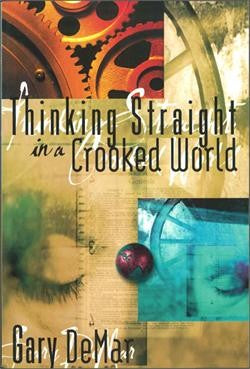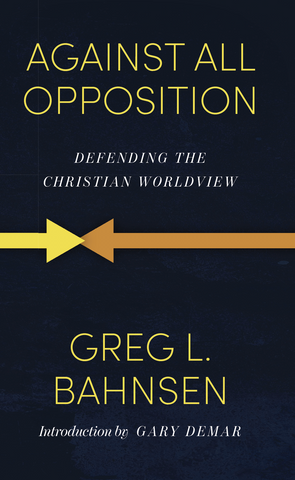When entering a battle, we must be equipped with the most effective weapons, a winning strategy, a commitment to prevail, and the assurance of victory. This is no less true for a spiritual battle where eternal destinies are at stake. The Bible describes the conflict between the Christian worldview and all opposing worldviews by using the metaphors of war (2 Cor. 10:3-6). Some might not like the warfare analogy, thinking that it’s not “spiritual” to describe the Christian’s walk with “worldly” terms.[1] The Bible gives a different account. While “the weapons of our warfare are not of the flesh” (2 Cor. 10:4), battle weapons are used to characterize the reality of spiritual war: armor, shield, breastplate, helmet, and sword 6:10-17). The Bible shows Jesus coming with “a sharp sword” from His mouth “so that with it He might smite the nations” (Rev. 19:15). In addition, God’s Word is described as “sharper than any two-edged sword, piercing as far as the division of soul and spirit, of both joints and marrow, and able to judge the thoughts and intentions of the heart” (Heb. 4:12). These descriptive metaphors are designed to remind us that defending the faith is serious business. It’s a war of ideas that have real life consequences.
A Modern Parable
God’s Word functions spiritually in a manner that is like the way a soldier would wield his sword against an enemy in battle. To modernize the biblical analogy and make it real for today’s readers, I’ve changed the weapons and the setting. The following parable takes our worldview struggles seriously, showing that the way we do battle is just as important as the spiritual weapons we use.
It’s ten o’clock at night. You’re just leaving the library building. This is the third night this week that you’ve had to work on your research paper. Out of the shadows of the alley behind the library building a man appears. He attempts to block your path. He’s very tall and large-framed. He’s holding a knife with a ten-inch blade. He starts to walk toward you. The campus is deserted. Screaming for help would be futile. You know he wants to run you through. He’s not after money. He wants your life.
You panic for a moment. But you remember that you’re armed with a revolver. The instructor at the survival school warned you there might be nights like this.
Your sweat-drenched hand reaches into your coat to grasp the handle of the gun. The campus menace is just a few feet away. You shout at him in a weakened voice:
“Stop! If you take one more step, I’ll shoot!”
He laughs. Your seemingly calm demeanor turns to panic. Fear descends on you like a thick cloud. His mocking response sends an unfamiliar chill over you.
“I don’t believe in guns.”
Fear has now gripped you like a vise. You’re confused. Your shooting instructor never covered this situation. You put the gun down and allow the brute to slash you to pieces.
Of course, this student’s reaction is absurd. Nobody in his right mind would cease to believe in the effectiveness of his weapon just because some brute didn’t believe in it. Let’s repeat the scene, but with a twist.
The mugger steps out from the shadows of the alley to block your path. His knife blade reflects the parking lot lights, and the gleam from the polished metal catches your eye. The knife looks huge! You realize he wants to slash you to pieces. You remain calm. You pull out your revolver and point it at the attacker. You shout to him in a confident voice,
“Stop! If you take one more step, I’ll shoot!”
He laughs. He shouts back to you, “I don’t believe in guns.”
With that last word he lunges at you with death in his eyes. You make a believer out of him by emptying the gun into his lunging body.
In the second scenario the student had confidence in his weapon. The mugger’s beliefs about the reliability of the weapon were irrelevant. His lack of belief in the power of the gun did not change the gun’s effectiveness. But the student’s beliefs about the reliability of his weapon were relevant.

Thinking Straight in a Crooked World
The nursery rhyme "There Was a Crooked Man" is an appropriate description of how sin affects us and our world. We live in a crooked world of ideas evaluated by crooked people. Left to our crooked nature, we can never fully understand what God has planned for us and His world. God has not left us without a corrective solution. He has given us a reliable reference point in the Bible so we can identify the crookedness and straighten it.
Buy NowThe student’s life depended on his believing in the reliability of the weapon to do what he was told it could do. The gun remained a gun, and the bullets remained bullets no matter what the mugger or student decided to believe. For the student to appropriate the potential of his weapon, he had to unleash its power. Of course, the student’s weapon had to be reliable.
The Bible is its own best defender. As Charles Spurgeon once said, “Defend the Bible? I would as soon defend a lion.”[2] The lion needs no outside defenders. As the king of the beasts, he is quite capable of defending himself. If the lion needed another beast to defend him, then that creature would be the king of the beasts. In a similar way the Bible is its own best defender. It’s the king of books because its words are the words of the King of kings.
How many times have you been confronted by someone who said he didn’t believe in God, the inerrancy and infallibility of the Bible, the divinity of Jesus Christ, miracles, the resurrection, and other essential Bible doctrines? And when you were confronted with such unbelief, how many times were you cut to pieces because you acted as if the Bible was not true unless you could convince the skeptic of its truthfulness on the skeptic’s terms? How often do you in practice deny the faith or its power because a skeptic did not believe the only authority that gives your faith validity—the Bible?
Let’s take a final look at our mugging story. There is another methodology that some Christians use that betrays the Bible’s self-authenticating authority.
The mugger sees your gun, but he is not convinced of its effectiveness. You consider his words of doubt and seek to persuade him that your gun is operative and lethal. You tell him about your gun’s fire power and the latest ballistics tests. You inform him of your weapon’s accuracy and its reliability under adverse conditions. You even recite a list of experts who agree with your facts. While you are presenting your evidence the attacker runs you through. You see, he doesn’t believe your sources of information. In fact, he says your facts are all wrong. The experts? Well, they’re just biased. They don’t like knives. They never have. Those in the National Knife Association (NKA) have their own statistical data, and they refute the conclusions of the National Gun Association (NGA).
Facts alone often don’t convince unbelievers of the reliability of the Bible or the existence of God. Facts have meaning only when they are interpreted by some standard as part of a comprehensive worldview. Facts are meaningful because God gives them meaning. Without God, facts are random and unintelligible.

Against All Opposition
The starting point is the God of the Bible. The Bible begins with this foundational presupposition: “In the beginning God created the heavens and the earth” (Gen. 1:1). Against All Opposition lays out the definitive apologetic model to help believers understand the biblical method of defending the Christian faith.
Buy NowCheck out volume 1 of Dr. Greg L. Bahnsen’s Apologetic Trilogy Against All Opposition. See Volume 2 (The Impossibility of the Contrary) here, and Volume 3 (Pushing the Antithesis) here. Get all three at a discount here.
Defending the Faith
Like the man with the knife who confronted the armed student, rival faiths are at work in the world. Often these rival faiths are consciously designed to stamp out all things Christian. Sometimes it’s more subtle than that. Many people just ignore the Christian worldview. Because the Christian worldview is rarely discussed in secular contexts (except to be ridiculed), the implicit message is to disregard Christianity as a serious worldview option. Be on your guard. This is the most subtle and destructive tactic. If you can be convinced that you and your world can be defined and interpreted without reference to Jesus Christ and His Word, then Christianity has been rendered irrelevant, and you are on the road to skepticism or outright unbelief.
You may have tried to defend the Christian faith but found that the arguments were too difficult to handle. The next time someone questioned your beliefs, you remained silent. You may have felt guilty for not standing up for Christ, but you really didn’t know what to say. After hearing the same arguments leveled against Christianity time after time, the walls of your own belief system started to crumble.
Maybe you were taught that Christians should not answer the critics. You just “believe.” Well, that doesn’t work for long. The Bible tells His people that we are responsible to defend the faith. Defending the faith—giving an answer to those who ask what our hope is—is part of what it means to be a Christian. It’s not an option.
The best way to handle attacks by skeptics is to have worked out an apologetic methodology. It’s been said that the best defense is a good offense. Keep in mind that the Bible is like a loaded revolver. The power to destroy all speculations raised up against the knowledge of God is inherent in God’s Word. Yet many Christians either don’t know how to use the Bible as a spiritual/apologetic weapon or don’t believe it is effective in confronting “philosophy and empty deception” based on the “tradition of men, according to the elementary principles of the world” (Col. 2:8). A cogently presented, comprehensive, and consistent Christian worldview can stand up to and answer any hostile belief system. But it takes work to understand how skeptics think, believe, and behave. Your job is not finished until you are always “ready to make a defense to everyone who asks you to give a reason for the hope that is in you” (1 Peter 3:15). This is what apologetics, defending the faith and calling to account all opposing faiths, is all about.
[1] Recent events should remind every Christian that the war is real. Larry Gene Ashbrook walked into the sanctuary of Wedgwood Baptist Church in Fort Worth, Texas, and opened fire, killing five. The gunman was intent on killing Christians. (David Van Biema, “Terror in the Sanctuary,” Time [September 27, 1999], 42-43).
[2] Quoted in John M. Frame, Apologetics to the Glory of God: An Introduction (Phillipsburg, NJ: Presbyterian and Reformed, 1994), 17.

